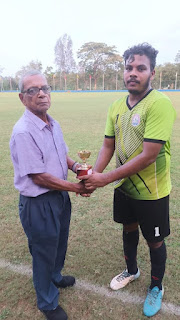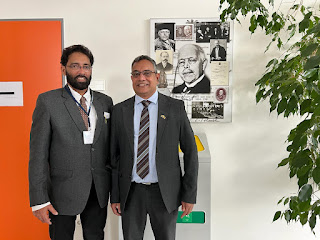Goan professor at the forefront in organising
Future Energy Carriers workshop in Germany
Dr. Levinson J Martins, Managing Director,
Goa Waste Management Corporation along Pranay Morajkar, Assistant Professor of
Chemistry, Goa University, two delegates from Goa attended the meet in Germany
BY Armstrong Vaz
When like-minded people come together amazing
things happen, wrote Goa-born German-based Professor Ravi Xavier Fernandes on
his LinkedIn page.
He was referring to the Indo-German Workshop
on Future Energy Carriers, a two-day workshop held at Physikalisch-Technische
Bundesanstalt (PTB) Braunschweig, Germany recently.
The Indo-German Bilateral Workshop on Future
Energy Carriers: Advancing Bio-circular Economy for Clean Energy saw delegates
from both India and German deliberate on various topics centered around Future
Energy, Circular Economy, Clean Energy and Circular Bioeconomy.
For the unknown Circular Bioeconomy is an
economy powered by nature. It is a new economic model that emphasizes the use
of renewable natural capital and focuses on minimizing waste, replacing the
wide range of non-renewable, fossil-based products currently in use.
“The willingness and motivation to work
together through excellent ideas and diverse strengths and expertise made this
Indo-German Workshop on Future Energy Carriers a big success,” said Ravi, an
alumnus of Chowgule College Margao and Goa university, who traces his roots to
Velim village.
The workshop, coordinated by Prof. Ravi
Xavier Fernandes, Physikalisch-Technische Bundesanstalt (PTB) Germany and Dr
Sanjukta Subudhi, The Energy and Resources Institute (TERI) served as a
platform for knowledge exchange, networking, and joint research initiatives
between experts from both countries.
PTB, Germany for which Prof Ravi works is the
National Metrology Institute of Germany with scientific and technical service
tasks. PTB measures with the highest accuracy and reliability – metrology as
the core competence. PTB stands for progress and reliability in metrology for
the benefit of society, trade and industry, and science.
“Thanks a lot, dear delegates from India and
Germany for your very active participation and lively discussions. This was the
first of its kind IGSTC (Indo-German Science & Technology Centre) Workshop
with Representatives from Academia, Industry, Research Institutions, Government
Officials sitting on one table to discuss one of the most important topics on
Sustainability. Looking forward to all our future bilateral and multilateral
interdisciplinary collaborations,” added Prof Ravi.
The workshop topics included: Biofuel
Production Technologies, Green Hydrogen Generation, Circular Economy
Approaches, Sustainability and Life Cycle Assessment, Regulation, Codes and
Standards, Business Models and Commercialization.
And there was more Goan connect to the
workshop with Dr. Levinson J Martins, Managing Director, Goa Waste Management
Corporation along with Pranay Morajkar, Assistant Professor of Chemistry, Goa
University being the two delegates from Goa who attended the meet in Germany.
Dr. Levinson presentation centered around
topic of “Unlocking Clean Energy: Harnessing Biomethanation for A Sustainable
Bio-Circular Economy”
He made a strong pitch for Biomethanation as
a promising avenue for sustainable energy generation and waste management and
which stands at the forefront of sustainable waste-to-energy solutions,
offering a pathway towards resource recovery and environmental stewardship.
He also favoured joint research in
biomethanation technology.
“There is a need for more research in
advancing biomethanation technology, looking forward to the vision for
collaboration between India and Germany in advancing biomethanation technology,
taking into account the strengths and expertise that each country brings to the
table he envisaged the need for joint research in the field,” he said in his
presentation.
Levinson also said that research work should
center around odour control in biomethanation plants.
“Research interventions with respect to
emerging technologies in odour management and integration of solid waste and
sewage treatment plant and extraction of Methane gas,” are the other areas
which need fine tuning, he said.
Taking a futuristic view of the emerging
alternative fuels Levinson made a strong pitch on the need for future
collaboration.
“Analysis of the future outlook for bio
methanation technology and considering factors such as technological
advancements, policy support, and market demand are some of the key areas where
the focus of future research,” he said.
He also added that there should be
identification of key requirements and challenges for scaling up biomethanation
infrastructure, including investment, regulatory frameworks, and public
awareness.
“Proposals for collaborative initiatives such
as joint research projects, knowledge exchange programs and solutions through
advance and cutting-edge technologies for problems faced currently to
accelerate the adoption of bio methanation technology on a global scale,” were
some steps he suggested in his talk, while urging delegates from Germany to
visit Goa and make a field trip to the facilities and have a closer look at
working of the solid waste management plants managed by
Goa Waste Management Corporation.
The other delegate from Goa Pranay was
delighted that he was part of the brainstorming workshop.
His presentation centered around
sustainability and climate change and the use of Nanomaterials to reduce carbon
footprint.
“My presentation was about using
Nanomaterials derived from waste to produce biofuels which can then be used to
improve combustion efficiency and reduce pollutant emissions. I also presented
how Catalytically CO2 can be converted to industrially important platform
chemicals, to address global warming and climate change,” said the Goa
University professor.
“This was one of the best bilateral research
meetings that I attended. Intense and enlightening research discussions among
some of the best Indo-German research groups. I am glad that I could attend and
contribute to the success of this meet, even in a small way,” Pranay said.
“Hats off to Prof Ravi Xavier Fernandes,
Sumit Agarwal and TERI and IGSTC for creating an excellent platform, successful
coordination and organization,” he added.
Labels: Germany, Goa, India, solar energy, tourism

.jpg)






.JPG)

.JPG)

.JPG)











.JPG)






.jpeg)
.jpeg)

.jpeg)
.jpeg)





